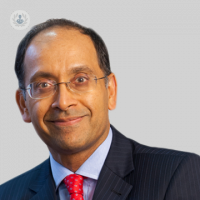Chest pain: when is it a cause for concern?
Autore:As a medical professional, I understand that experiencing chest pain can be a concerning and sometimes frightening experience. Leading cardiologist Dr Deven Patel provides a guide as to what chest pain can mean, when to seek medical attention, and some common causes.

What Is chest pain?
Chest pain is exactly what it sounds like – discomfort or pain felt anywhere in the chest area, from the shoulders to the ribs. It can vary greatly in intensity, duration, and sensation, from a dull ache to sharp stabbing pains.
When should I seek help for chest pain?
While chest pain can have various causes, some of which may not be serious, it's important not to ignore it. If you experience sudden, severe chest pain, particularly if it's accompanied by symptoms such as shortness of breath, nausea, sweating, or pain radiating to the arm or jaw, you should seek immediate medical attention.
What are the possible causes of chest pain?
There are many potential causes of chest pain, ranging from benign to life-threatening. Some common causes include:
Musculoskeletal issues: Strained muscles or inflamed joints in the chest can cause pain, especially with movement or deep breathing.
Respiratory conditions: Conditions such as pneumonia, bronchitis, or asthma can cause chest tightness or pain.
Heart-related issues: While not all chest pain is due to heart problems, issues like angina (caused by reduced blood flow to the heart) or a heart attack can manifest as chest pain. This is why it is crucial to seek medical attention if you're experiencing chest discomfort.
Panic attacks: Anxiety and panic attacks can often mimic symptoms of a heart attack, causing chest pain, rapid heartbeat, and difficulty breathing.
What to expect during evaluation
If you seek medical help for chest pain, it is likely that your doctor will conduct a thorough evaluation. This may include asking about your symptoms, medical history, and performing a physical examination. Depending on their findings, further tests such as an electrocardiogram (ECG), blood tests, or imaging studies may be ordered to help determine the cause of your chest pain.
How can chest pain be prevented?
While some causes of chest pain may be unavoidable, there are steps you can take to reduce your risk:
- Keep up a well-balanced lifestyle by engaging in regular exercise and maintaining a nutritious diet.
- Handle stress by practising relaxation methods or reaching out to a mental health expert for support.
- Quit smoking and limit alcohol intake.
- Follow any treatment plans prescribed by your healthcare provider for underlying conditions such as high blood pressure or high cholesterol.
Chest pain can be a concerning symptom, but it's essential not to panic. By understanding potential causes and knowing when to seek medical help, you can take control of your health and ensure prompt treatment if needed. If you experience chest pain, especially if it's severe or accompanied by other concerning symptoms, do not hesitate to seek medical attention.
If you are concerned about chest pain and would like to book a consultation with Dr Patel, do not hesitate to do so by visiting his Top Doctors profile today


